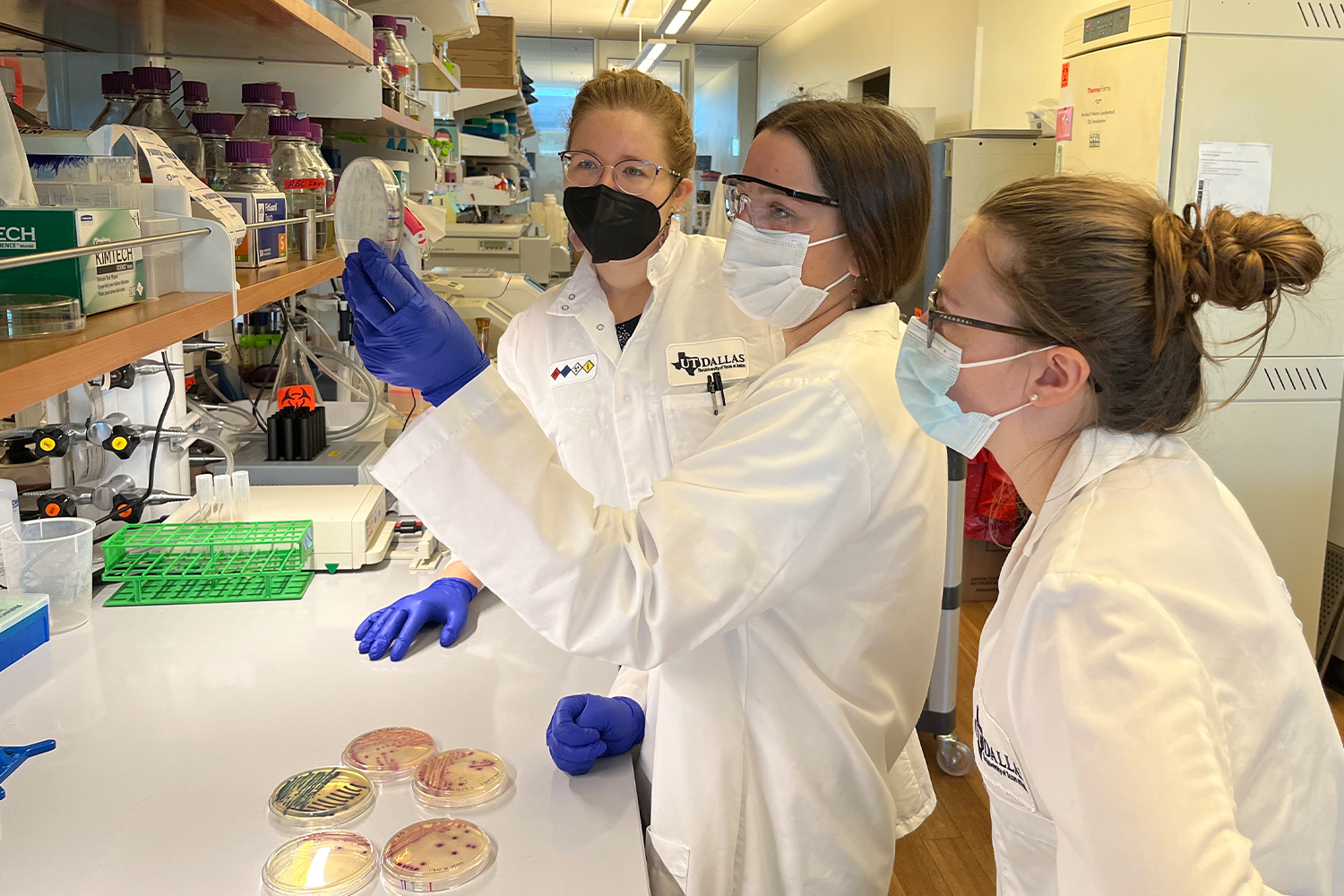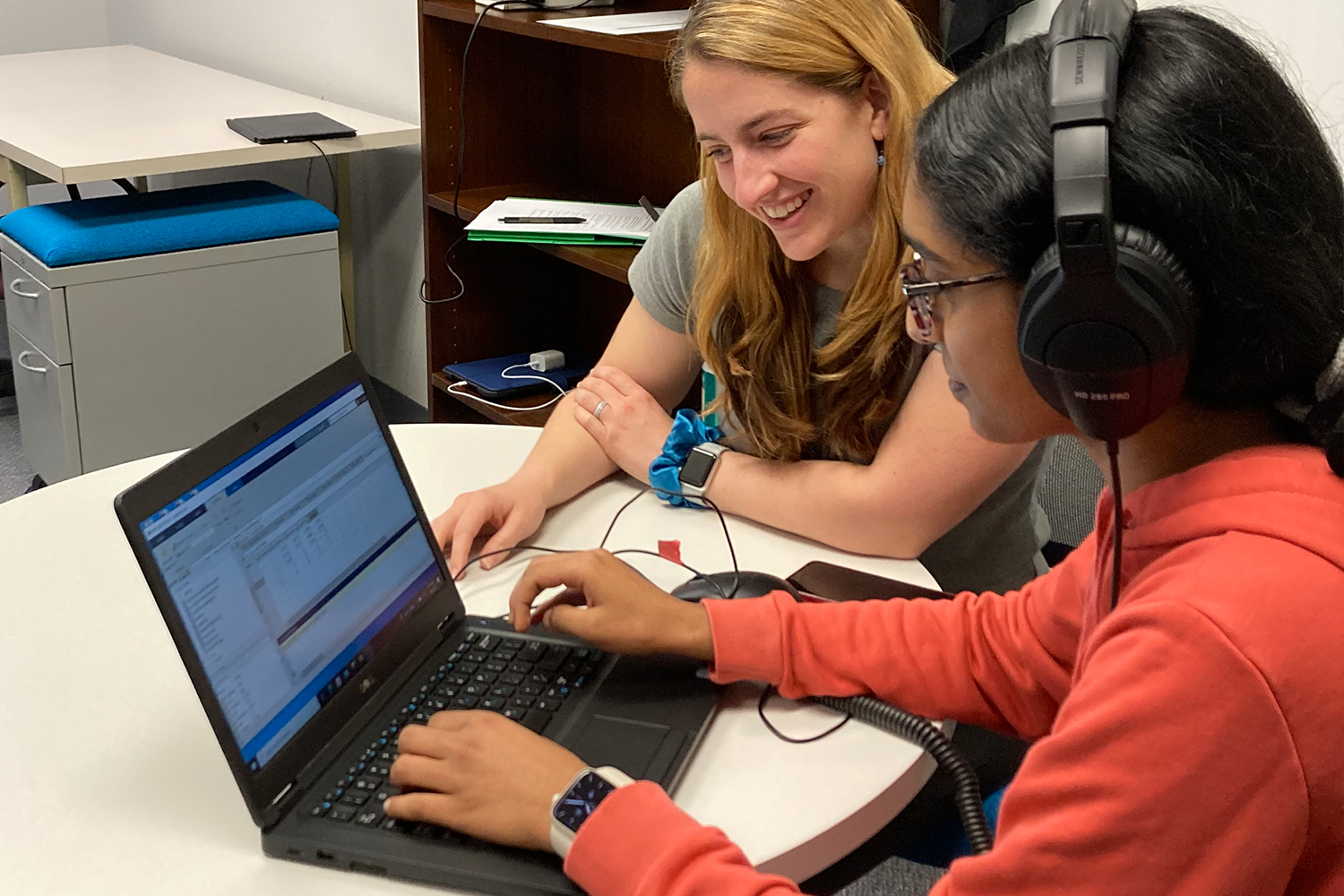High School Students Explore Science at UT Dallas
08.05.2022
 High school student and NanoExplorer Eve Spiro (center) examines the growth of bacteria in a cell-culture dish alongside research mentors Dr. Nicole De Nisco (left), assistant professor of biological sciences, and undergraduate student Jessica Komarovsky.
High school student and NanoExplorer Eve Spiro (center) examines the growth of bacteria in a cell-culture dish alongside research mentors Dr. Nicole De Nisco (left), assistant professor of biological sciences, and undergraduate student Jessica Komarovsky.
Seventeen North Texas high school students recently wrapped up a summer of scientific research at The University of Texas at Dallas involving projects related to cancer, nanotechnology, speech-language processing and disease-sensing devices.
The seven-week George A. Jeffrey NanoExplorers Program allows aspiring scientists to perform original research in a faculty mentor’s lab, where they learn investigative skills while working alongside other lab members. Examples of this summer’s projects include characterizing artificial muscles made from carbon nanotube yarns and polymer fibers, investigating the use of gold nanoparticles for studying kidney disease, examining the physiology of cancer cells and bacteria, and developing a smartphone-based sensor for respiratory viruses.
NanoExplorer Eve Spiro, a junior at Plano West Senior High School, performed research in the lab of Dr. Nicole De Nisco, assistant professor of biological sciences in the School of Natural Sciences and Mathematics. Mentored by UT Dallas biology senior Jessica Komarovsky, Spiro investigated growth requirements for probiotic or “good” bacteria.
Spiro worked with a species of lactobacilli that are commonly found in the urinary tract of healthy women. She explored whether these bacteria required fatty acids present in the heathy female urinary tract for growth.
“Understanding what nutrients, like fatty acids, are required for robust growth of these ‘good’ lactobacilli will be important for the design of more effective probiotic therapies for urinary tract disorders, like urinary tract infections, which affect over 60% of all women,” De Nisco said.
 NanoExplorer Vaishnavi Moturi (right) works alongside Dr. Kelly Jahn, assistant professor of speech, language and hearing, on research that could help improve the listening experiences of cochlear implant users.
NanoExplorer Vaishnavi Moturi (right) works alongside Dr. Kelly Jahn, assistant professor of speech, language and hearing, on research that could help improve the listening experiences of cochlear implant users.
Vaishnavi Moturi, an incoming sophomore at Centennial High School in Frisco, worked alongside Dr. Kelly Jahn, assistant professor of speech, language and hearing in the School of Behavioral and Brain Sciences, in Jahn’s Neuroaudiology and Prosthetic Hearing Lab.
Their project could have implications for cochlear implant users.
“Even though cochlear implants can restore some hearing, they are not perfect, and we are still learning about factors that influence how well a person can hear with the devices,” Jahn said.
In her short time in the lab, Moturi implemented a project from scratch to understand better how cochlear implants influence emotional responses to everyday sounds. She artificially simulated how environmental stimuli would sound through a cochlear implant, played the simulated sounds to people with typical hearing and asked them to indicate their emotional reactions to the sounds.
Moturi determined that cochlear implants may reduce the range of emotional responses that an individual experiences when they hear a sound, Jahn said.
“Our lab was thrilled to host a NanoExplorer student this summer,” she said. “The program provides a unique opportunity for high school students to learn about what it’s like to conduct research at a university, while delving into an advanced topic area that they are interested in.”
Dr. Ray Baughman, the Robert A. Welch Distinguished Chair in Chemistry and director of the Alan G. MacDiarmid NanoTech Institute at UT Dallas, launched the NanoExplorers program in summer 2002. The outreach program is named for a University of Pittsburgh professor who gave a young Baughman – then in the 10th grade – an opportunity to do original research.
–Amanda Siegfried
Tags: BBS, NSM, Outreach